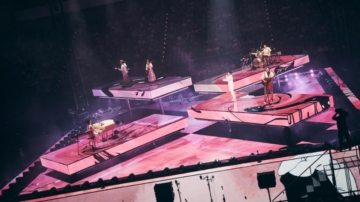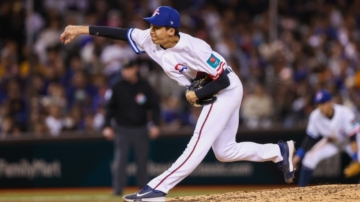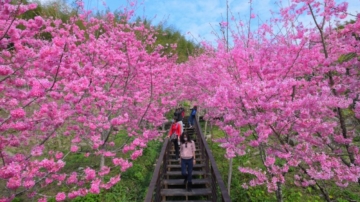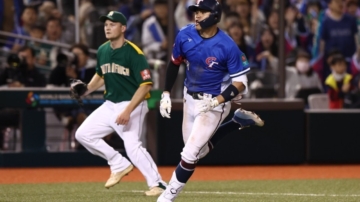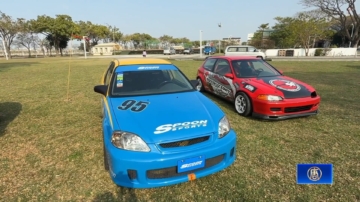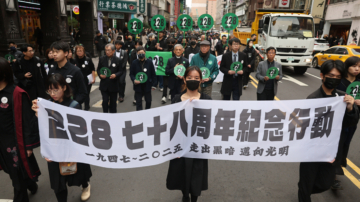【新唐人2012年10月6日讯】中华民国文化部部长龙应台,在最近发表的文章“台湾人为何不想统一”中比喻,民主有如食衣住行般,落实在台湾人的生活中。而“对大部分台湾人而言,其实是一个生活方式的选择。”她的文章最近在大陆网站上传播,引起极大的回响。接下来,我们就来了解一下,对于这个议题,两岸民众怎么说。
“台湾人为何不想统一”文章中,龙应台说,“台湾人已经习惯生活在一个民主体制里,而民主体制落实在茶米油盐的生活中。”
龙应台近年来多次在不同的场合,指出“民主制度”的优点;而她1985年的畅销着作《野火集》,是80年代对台湾民主发展极具影响的一本书。不少大陆民众因此对她也不陌生。
资深政治评论家林保华:“她是想比较感性的来说明,台湾人为甚么不想跟中国统一。我觉得习惯跟生活方式当然跟制度有关系。干脆讲,这个就是自由、民主、人权和法治﹔一句话,就是双方的制度根本就不同。”
资深政治评论家林保华2006年3月迁居台湾台北,他表示,“当然”不想和中共统一。
林保华:“整个华人社会里面,台湾相对来讲是比较有言论自由的,特别是我们从事评论工作,这言论自由是最重要。香港已经是比较差的,因为已经给中国控制了。”
“台湾人为何不想统一”的文章中说,台湾政府大楼为民众开放,办手续一路通行无阻;民众出国旅游或进修,不需要经过层层批准;想出版书籍,也不需事先经过审查;政府的年度预算,都在网上公开提供查询。
台湾民众习惯看到,离职官员搬离官邸,撤去秘书、取消福利和特支;官员为政策错误而被弹劾或下台。法律保障民众的权利;需要病床,不需经过贿赂。
台湾药品代理商陈丽云:“最简单的说法,就个人来讲不管是国家,小至个人也好,你是要当你自己的主人,还是希望你的人生都被别人来支配。譬如说,你的收入或者是生活起居,甚至嗜好兴趣一切,你希望当自己的主宰,还是希望被别人支配来控制,你能够当自己的主人吗?”
台北的一名刘建筑师也认为,从地理、政治、经济、文化各个角度来比较,台湾人都不愿意与中共统一。
台北刘建筑师:“跟它统一我们就是它的喉咙,我们地位变很重要,我们控制太平洋,不就变成一个军事基地,一天到晚受军事威胁;中国他们政治完全没有上轨道,随便一个薄熙来他的地位就可以杀人放火,这完全不可以信任这种政府;经济面,你看他们现在商人,黑心食物、房子用竹子钢筋,他也敢盖。这完全没有任何道德感。”
台湾的民主走到今天,是经过了几十年的努力,和许多民主人士的牺牲。台湾药品代理商陈丽云认为,目前,台湾人希望更民主、更进步,或许大陆民众无法了解。
台湾药品代理商陈丽云:“所以,我们当然绝对不会希望像大陆这样喊口号的方式,说自己也是很民主,事实上我们是有很大的差距,我们是没有办法接受纯粹是口号式的统一。”
目前,网上有超过十万大陆民众回贴,关注这一议题。但是,一位贵州网友提出疑问,他表示:“大陆领导者们希望在‘一国两制’下和你们统一,共同建设一个强大繁荣的中国,这难道不是我们共同的追求吗?为甚么非要追求谁成为领导者呢?”
龙应台在文章中说:“海峡两岸,哪里是统一和独立的对决?……社会主义和资本主义的相冲?..民族主义和分离主义的矛盾?对大部分台湾人而言,其实是一个生活方式的选择,极其具体,……一点不抽像。”
采访编辑/梁欣 后制/钟元
Why Taiwanese people do not want “Unity”
Long Yingtai, head of Taiwan Ministry of Culture published a
recent article “Why Taiwanese do not want Unity”.
It said democracy is like food, clothes and homes,
it is implemented in Taiwanese people's lives.
Yet “for most Taiwanese, it is a lifestyle choice.” Her article
has incited many responses on Mainland websites.
Now let's take hear what Taiwanese
and Chinese have to say about it.
Long says in the article that Taiwanese are used to
living in a democratic system,
which is implemented through practicality of everyday life.
This year, Long has pointed out the advantages of a
democratic system in many different instances.
“The Wild Fire”, her best selling work in 1985, had a great
impact upon Taiwan's democratic development in the ‘80s.
Many Mainlanders became familiar with her through
this book.
Veteran political commentator Lin Baohua: “She wants to
express sensibly why Taiwanese do not want to unify with China.
I feel habits and lifestyles definitely have something
to do with the [political] system.
Simply, that is freedom, democracy, human rights and
ruled by law.
In one sentence, the two have fundamentally
different systems.”
Lin Baohua expresses, 'Of Course'
Taiwan does not want to unify with the CCP.
Lin: “In all of Asian society, relatively speaking, Taiwan has
freedom of speech, especially us who work in commentating,
freedom of speech is the most important. Hong Kong is
already worse because it has been controlled by China.”
In “Why Taiwanese do not want Unity”, it said Taiwan
government buildings are open for the public;
completing procedures are smooth; citizens do not need
layers and layers of permission to travel out of the country or advance studies,
no censorship is required before publishing books,
government's annual budget is posted openly online.
Taiwanese are used to seeing retired officials move out of
official residence, remove their secretary, cancel welfare and special compensation.
Officials step down for making mistakes on policies.
Laws protect people's rights.
One does not need to bribe to get a hospital bed.
Chen Liyun, Taiwan pharmaceutical representative said:
“The easiest way to put it is: do you want to be your own boss or hope your life is dominated by others?
For example your income or daily life, even in your hobbies and
interests, you hope to be your own boss, or hope someone else controls it, can you then be your own boss?”
Architect Liu from Taipei also believes, to compare from all
angles; geographically, politically, economically and culturally,
that Taiwanese do not want to unify with the Chinese
Communist Party (CCP).
Architect Liu: “We are their state-run media if we unify with
them. Our position is very important, we control the Pacific.
But did it not become a military base, being threatened day
and night?
China's politics are completely not on track, a position like
Bo Xilai's allows him to do whatever bad things he wants.
This type of government is completely not trustworthy.
Economically, look at their businessmen, black hearted fools,
they even dare to use bamboo as steel bars for houses.
There is completely no sense of morality.”
The democracy in Taiwan today came from dozens of years
of efforts and the sacrifices of many democratic activists.
Chen Liyun, Taiwan pharmaceutical representative, believes
Taiwanese hope for more democracy and more advancement right now.
Maybe it is something that Mainlanders are unable
to understand.
Chen Liyun: “So, of course we absolutely do not hope to
be like Mainland and say that we are also very democratic.
In reality we are very different. We cannot accept the
tradition of empty slogans.”
Currently, more than 100,000 Mainlanders responded to
this topic online. However, a netizen from Guizhou is skeptical.
He said: “Mainland leaders hope to unify with you under 'One
Country, Two Systems' rule and build a strong and prosperous
China together, is this not our common pursuit?
Why insist on pursuing who becomes the leader?”
Long Yingtai says in the article: “Where is the showdown
between Taiwan and China for unity?
The clash between socialism and capitalism?
The conflict between democracy and separatism?
For most Taiwanese, it's a matter of lifestyle choice,
very specific, not abstract at all.”
“台湾人为何不想统一”文章中,龙应台说,“台湾人已经习惯生活在一个民主体制里,而民主体制落实在茶米油盐的生活中。”
龙应台近年来多次在不同的场合,指出“民主制度”的优点;而她1985年的畅销着作《野火集》,是80年代对台湾民主发展极具影响的一本书。不少大陆民众因此对她也不陌生。
资深政治评论家林保华:“她是想比较感性的来说明,台湾人为甚么不想跟中国统一。我觉得习惯跟生活方式当然跟制度有关系。干脆讲,这个就是自由、民主、人权和法治﹔一句话,就是双方的制度根本就不同。”
资深政治评论家林保华2006年3月迁居台湾台北,他表示,“当然”不想和中共统一。
林保华:“整个华人社会里面,台湾相对来讲是比较有言论自由的,特别是我们从事评论工作,这言论自由是最重要。香港已经是比较差的,因为已经给中国控制了。”
“台湾人为何不想统一”的文章中说,台湾政府大楼为民众开放,办手续一路通行无阻;民众出国旅游或进修,不需要经过层层批准;想出版书籍,也不需事先经过审查;政府的年度预算,都在网上公开提供查询。
台湾民众习惯看到,离职官员搬离官邸,撤去秘书、取消福利和特支;官员为政策错误而被弹劾或下台。法律保障民众的权利;需要病床,不需经过贿赂。
台湾药品代理商陈丽云:“最简单的说法,就个人来讲不管是国家,小至个人也好,你是要当你自己的主人,还是希望你的人生都被别人来支配。譬如说,你的收入或者是生活起居,甚至嗜好兴趣一切,你希望当自己的主宰,还是希望被别人支配来控制,你能够当自己的主人吗?”
台北的一名刘建筑师也认为,从地理、政治、经济、文化各个角度来比较,台湾人都不愿意与中共统一。
台北刘建筑师:“跟它统一我们就是它的喉咙,我们地位变很重要,我们控制太平洋,不就变成一个军事基地,一天到晚受军事威胁;中国他们政治完全没有上轨道,随便一个薄熙来他的地位就可以杀人放火,这完全不可以信任这种政府;经济面,你看他们现在商人,黑心食物、房子用竹子钢筋,他也敢盖。这完全没有任何道德感。”
台湾的民主走到今天,是经过了几十年的努力,和许多民主人士的牺牲。台湾药品代理商陈丽云认为,目前,台湾人希望更民主、更进步,或许大陆民众无法了解。
台湾药品代理商陈丽云:“所以,我们当然绝对不会希望像大陆这样喊口号的方式,说自己也是很民主,事实上我们是有很大的差距,我们是没有办法接受纯粹是口号式的统一。”
目前,网上有超过十万大陆民众回贴,关注这一议题。但是,一位贵州网友提出疑问,他表示:“大陆领导者们希望在‘一国两制’下和你们统一,共同建设一个强大繁荣的中国,这难道不是我们共同的追求吗?为甚么非要追求谁成为领导者呢?”
龙应台在文章中说:“海峡两岸,哪里是统一和独立的对决?……社会主义和资本主义的相冲?..民族主义和分离主义的矛盾?对大部分台湾人而言,其实是一个生活方式的选择,极其具体,……一点不抽像。”
采访编辑/梁欣 后制/钟元
Why Taiwanese people do not want “Unity”
Long Yingtai, head of Taiwan Ministry of Culture published a
recent article “Why Taiwanese do not want Unity”.
It said democracy is like food, clothes and homes,
it is implemented in Taiwanese people's lives.
Yet “for most Taiwanese, it is a lifestyle choice.” Her article
has incited many responses on Mainland websites.
Now let's take hear what Taiwanese
and Chinese have to say about it.
Long says in the article that Taiwanese are used to
living in a democratic system,
which is implemented through practicality of everyday life.
This year, Long has pointed out the advantages of a
democratic system in many different instances.
“The Wild Fire”, her best selling work in 1985, had a great
impact upon Taiwan's democratic development in the ‘80s.
Many Mainlanders became familiar with her through
this book.
Veteran political commentator Lin Baohua: “She wants to
express sensibly why Taiwanese do not want to unify with China.
I feel habits and lifestyles definitely have something
to do with the [political] system.
Simply, that is freedom, democracy, human rights and
ruled by law.
In one sentence, the two have fundamentally
different systems.”
Lin Baohua expresses, 'Of Course'
Taiwan does not want to unify with the CCP.
Lin: “In all of Asian society, relatively speaking, Taiwan has
freedom of speech, especially us who work in commentating,
freedom of speech is the most important. Hong Kong is
already worse because it has been controlled by China.”
In “Why Taiwanese do not want Unity”, it said Taiwan
government buildings are open for the public;
completing procedures are smooth; citizens do not need
layers and layers of permission to travel out of the country or advance studies,
no censorship is required before publishing books,
government's annual budget is posted openly online.
Taiwanese are used to seeing retired officials move out of
official residence, remove their secretary, cancel welfare and special compensation.
Officials step down for making mistakes on policies.
Laws protect people's rights.
One does not need to bribe to get a hospital bed.
Chen Liyun, Taiwan pharmaceutical representative said:
“The easiest way to put it is: do you want to be your own boss or hope your life is dominated by others?
For example your income or daily life, even in your hobbies and
interests, you hope to be your own boss, or hope someone else controls it, can you then be your own boss?”
Architect Liu from Taipei also believes, to compare from all
angles; geographically, politically, economically and culturally,
that Taiwanese do not want to unify with the Chinese
Communist Party (CCP).
Architect Liu: “We are their state-run media if we unify with
them. Our position is very important, we control the Pacific.
But did it not become a military base, being threatened day
and night?
China's politics are completely not on track, a position like
Bo Xilai's allows him to do whatever bad things he wants.
This type of government is completely not trustworthy.
Economically, look at their businessmen, black hearted fools,
they even dare to use bamboo as steel bars for houses.
There is completely no sense of morality.”
The democracy in Taiwan today came from dozens of years
of efforts and the sacrifices of many democratic activists.
Chen Liyun, Taiwan pharmaceutical representative, believes
Taiwanese hope for more democracy and more advancement right now.
Maybe it is something that Mainlanders are unable
to understand.
Chen Liyun: “So, of course we absolutely do not hope to
be like Mainland and say that we are also very democratic.
In reality we are very different. We cannot accept the
tradition of empty slogans.”
Currently, more than 100,000 Mainlanders responded to
this topic online. However, a netizen from Guizhou is skeptical.
He said: “Mainland leaders hope to unify with you under 'One
Country, Two Systems' rule and build a strong and prosperous
China together, is this not our common pursuit?
Why insist on pursuing who becomes the leader?”
Long Yingtai says in the article: “Where is the showdown
between Taiwan and China for unity?
The clash between socialism and capitalism?
The conflict between democracy and separatism?
For most Taiwanese, it's a matter of lifestyle choice,
very specific, not abstract at all.”

